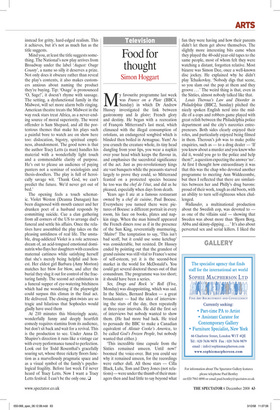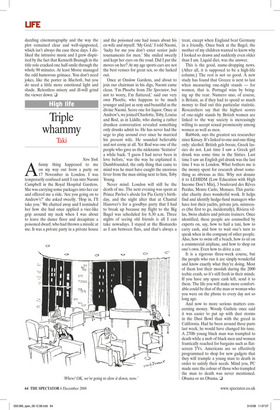Food for thought
Simon Hoggart
My favourite programme last week was France on a Plate (BBC4, Sunday) in which Dr Andrew Hussey investigated the link between gastronomy and la gloire; French glory and destiny. He began with a recreation of François Mitterrand’s last meal, which climaxed with the illegal consumption of ortolans, an endangered songbird which is blinded then boiled in Armagnac. Yum! As you crunch the creature whole, its tiny head dangling from your lips, you wear a napkin over your head which keeps the flavour in, and emphasises the sacerdotal significance of the act. Just as pre-revolutionary kings ate vast banquets while the peasants starved largely to prove they could, so Mitterrand feasted on a protected species because he too was the chef de l’état, and did as he pleased, especially when days from death.
Years ago I ate at a famous restaurant owned by a chef de cuisine, Paul Bocuse. Everywhere you turned there were pictures of Bocuse: a different portrait in every room, his face on books, plates and napkin rings. When the man himself appeared the French diners rose as if in the presence of the Sun King, reverentially murmuring, ‘Maître!’ The temptation to say, ‘This isn’t bad scoff, but it could use some ketchup’ was considerable, but resisted. Dr Hussey ended by pointing out that the grandest of grand cuisine was still vital to France’s sense of self-esteem, yet it is the second-best market in the world for McDonald’s. You could get several doctoral theses out of that conundrum. The programme was too short; it should have been a series.
Sex, Drugs and Rock ’n’ Roll (Five, Monday) was disappointing, which was sad. In the Sixties, Bernard Braden — a great broadcaster — had the idea of interviewing the stars of the day, then repeatedly at three-year intervals. He did the first set of interviews but nobody wanted to show them. (He had more bad luck. He tried to persuade the BBC to make a Canadian equivalent of Alistair Cooke’s America, to be called God’s Frozen People, but nobody wanted that either.) ‘This incredible time capsule from the Sixties remained unseen. Until now!’ boomed the voice-over. But you could see why it remained unseen, for the recordings were rather dull. All those stars — Cilla Black, Lulu, Tom and Davy Jones (not relations) — were under the thumb of their managers then and had little to say beyond what fun they were having and how their parents didn’t let them get above themselves. The slightly more interesting bits came when they played the 40-odd year-old tapes to the same people, most of whom felt they were watching a distant, forgotten relative. Most bizarre was Simon Dee, once a well-known disc jockey. He explained why he didn’t play Tchaikovksy. ‘Nobody digs that scene, so you slam out the pop at them and they groove ... ’ The weird thing is that, even in the Sixties, almost nobody talked like that.
Louis Theroux’s Law and Disorder in Philadelphia (BBC2, Sunday) pitched the nicely spoken English nerd into the middle of a cops and robbers game played with great relish between the Philadelphia police department and the city’s narcotics entrepreneurs. Both sides clearly enjoyed their roles, and particularly enjoyed being filmed in them. Theroux’s job was to make polite enquiries, such as — to a drug dealer — ‘If you knew about a murder and you knew who did it, would you go to the police and help them?’, a question expecting the answer ‘no’. At first I thought how extraordinary it was that this was the chap who devoted another programme to meeting Ann Widdecombe, but then I reflected that there are similarities between her and Philly’s drug barons: proud of their work, tough as old boots, with an ability to turn self-righteous when challenged.
Wallander, a multinational production about the Swedish cop, was devoted to — as one of the villains said — showing that Sweden was about more than ‘Bjorn Borg, Abba and skinny-dipping ... ’ It’s also about perverted sex and serial killers. I liked the dazzling cinematography and the way the plot remained clear and well-signposted, which isn’t always the case these days. I disliked the intrusive music and I grew dispirited by the fact that Kenneth Branagh in the title role cracked one half-smile through the whole 90 minutes. At least Morse managed the odd humorous grimace. You don’t need jokes, like the porter in Macbeth, but you do need a little more emotional light and shade. Relentless misery and ill-will grind the viewer down. ❑



















































































 Previous page
Previous page